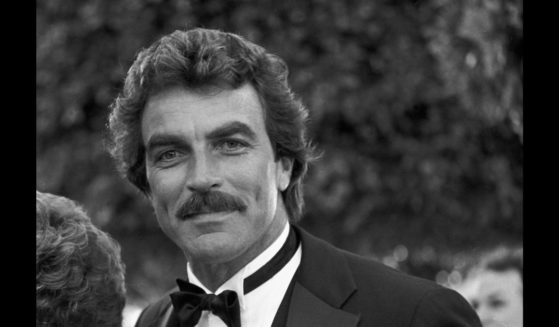TWJ Exclusive: Roger Stone Considering Rushmore-Esque Tattoo of Trump, Reagan and Other Conservative Heavyweights
From tailored 20th century chalk-striped suits to well-earned titles of “agent provocateur” and “dirty trickster,” Roger Stone is arguably the most controversial and widely recognizable political operative in modern American history.
For many an onlooker, however, nothing proves Stone a polarizing and eccentric figure quite like his famous back tattoo: the smiling face of disgraced former President Richard Nixon.
“The Nixon tattoo is really all you need to know about Roger,” left-wing media legal analyst Jeffrey Toobin said in a recent Netflix documentary. “He thinks Nixon’s approach to politics — the toughness, the win-at-all-costs mentality — that’s what Roger reflects.”
Now, roughly one week after President Donald Trump’s July 10 commutation of a 40-month federal prison sentence stemming from former special counsel Robert Mueller’s Russia probe, Stone told The Western Journal he is strongly “considering” new presidential ink.
“Well, I’m asked constantly this question: Am I now going to get a tattoo of Donald Trump?” Stone said.
“I was thinking about getting a tattoo of President Trump, Ronald Reagan, Barry Goldwater and Bill Buckley to add them to my back in a Mount Rushmore-type effect,” he said. “That’s what I’m considering.”
Without 40 months to serve in prison, I imagine Roger Stone now has time to get Trump tattooed on his back next to his tattoo of Richard Nixon. #Ick. pic.twitter.com/EiYIbNLBNG
— Barb McQuade (@BarbMcQuade) July 11, 2020
The Nixon tattoo was never a political statement, Stone said. But this new ink would be.
Nixon was a figure of hope for Stone in his younger years, a reminder to remain resilient. Trump, Reagan, Goldwater and Buckley were his ideological forefathers.
“I think I’ve made it clear that my tattoo of Nixon is not a political statement,” Stone said. “To me, it’s a personal reminder that in life, when you have difficulties, when you were put to the test, when you suffer defeats or setbacks, when you were disappointed and discouraged, that you have an obligation to dust yourself off and get back in the game.”
“The story of Nixon is a story of persistence. It’s a story of resilience. It’s the story of the greatest political comeback in American history. Therefore, it is a life lesson for anybody who has difficulty,” he said.
In November 1962, Richard Nixon was bound for anywhere but the White House.
As the sitting vice president for widely popular Republican President Dwight D. Eisenhower, Nixon had fallen to the young, charismatic Democratic Sen. John F. Kennedy of Massachusetts by a slim margin in the 1960 presidential election.
Still thinking himself politically viable, Nixon quickly turned his attentions to then-conservative California, certain he could reclaim the state governor’s mansion from low-polling Democrat Pat Brown. He failed, falling once again on Election Day — but this time by the wide margin of roughly 5 percentage points.
In the news conference that followed, the former vice president briefly congratulated Brown before attacking the media and announcing his departure from public life.
“I leave you gentlemen now,” Nixon famously said. “Just think how much you’re going to be missing. You won’t have Nixon to kick around anymore, because gentlemen, this is my last press conference.”
Allowing himself to be passed over for the Republican presidential nomination in 1964 by conservative stalwart and Arizona Sen. Barry Goldwater, however, Nixon was down but not out.
The high-profile two-time political loser would go on re-enter the political fray in 1968, securing himself four years’ residence on Pennsylvania Avenue — and another four after that.
The fact that Nixon’s White House tenure would later be cut short by the unprecedented Watergate scandal, however, would not dissuade a young Stone from idolizing the 37th president for his political and personal revival.
Roger Stone emerged from court today channeling former president Richard Nixon as he flashed a peace sign with both hands. https://t.co/6WV6gV1eRB pic.twitter.com/dGGIlUcbIk
— The Boston Globe (@BostonGlobe) January 25, 2019
“He’d been through a lot obviously, but I think he was just as resilient as ever,” Stone said in the Netflix documentary. “His greatest single quality is resilience and that’s the purpose of my tattoo.”
“That’s the story of Nixon: A man is not finished when he is defeated, he’s only finished when he quits.” he said.
Stone, of course, was there to see much of it first hand.
According to Politico, Stone found himself in Nixon’s wider circle in his late teen years and early adulthood, serving as a junior scheduler on Nixon’s re-election campaign before being dragged into the Watergate scandal as a result of unplanned communications with Democratic National Committee burglar James McCord at the time of McCord’s arrest.
He would go on to serve in conservative campaign and lobbying operations under Bob Dole, George W. Bush and eventually Trump.
Stone’s proximity to Nixon, however, clearly left the strongest impression, with the political operative taking on not only the famed back tattoo but several of the former president’s mannerisms as well.
Following his arraignment on seven federal felony charges in January 2019, Stone re-emerged from court and flashed Nixon’s signature double-peace sign hand gesture before a crowd of journalists and protesters, The Washington Post reported.
On Friday, Stone told The Western Journal that his next tattoo, should he choose to get one, will be less representative of the resilience required in challenging times.
Instead, it will be an artistic monument to those who established the political values Stone would like to see guiding both his life and the nation at large.
“Those are the fathers of modern conservatism, in its founding and in its application,” Stone said of Trump, Reagan, Goldwater and Buckley.
Stone was nuanced in defining what that conservatism meant to him on Friday, citing the Republican Party as a group of individuals from diverse ideological backgrounds.
“There are all kinds of conservatives and I respect all of them,” he said. “But [conservatism] is an adherence to basic Christian values. It is a belief in maximum personal liberty, small and unoppressive government, a strong military as a deterrent, rather than as a neocon type of expansionary effort that goes around the world looking for trouble. It is a belief in a sound economics, low taxes, a sound American dollar. It’s a belief in God, in my opinion.”
“Broadly defined, I think that pretty much says it. I’m not a believer in the state, capital ‘S.’ I’m a believer in the individual,” he added.
Truth and Accuracy
We are committed to truth and accuracy in all of our journalism. Read our editorial standards.











